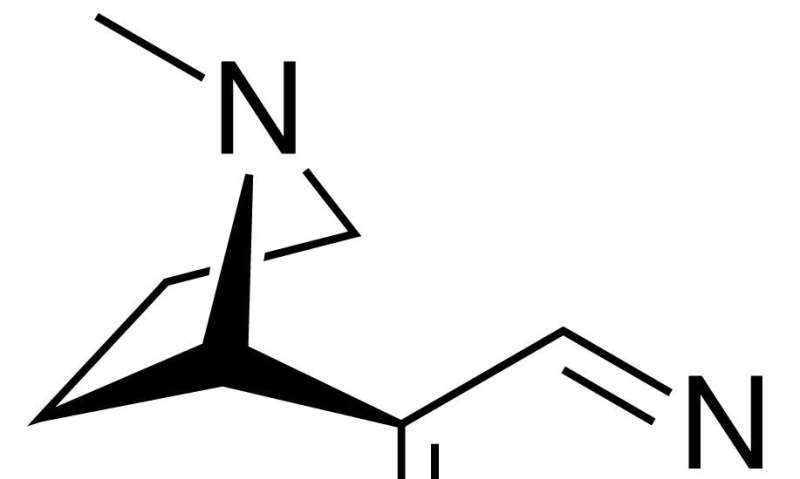Nicotine's hold: What the gut and gender have to do with it

Many people who smoke or chew tobacco can't seem to escape nicotine's addictive properties. Studies show that women in particular seem to have a harder time quitting, even with assistance, when compared to men. Now, scientists report in a mouse study published in ACS' journal Chemical Research in Toxicology that the difference in gender smoking patterns and smoking's effects could be due to how nicotine impacts the brain-gut relationship.
Cigarette smoking has long been a major public health issue. It's related to one out of every five deaths in the U.S., according to the U.S. Centers for Disease Control and Prevention. When a person smokes tobacco, nicotine is delivered mainly to the lungs. But with skin patches and chewing tobacco, nicotine crosses the skin and into the gastrointestinal tract, respectively. Previous research has shown that nicotine and the nervous system interact, producing a number of effects including the release of the "feel-good" chemical dopamine. Studies have also shown that the effects of nicotine are gender-dependent. To more fully understand why this is, Kun Lu and colleagues wanted to explore how nicotine affects male and female gut microbiomes.
The researchers set up a 13-week experiment during which they administered nicotine-infused water to mice. An analysis of the animals' fecal samples showed major differences in the composition of the microbiomes in male and female mice. Levels of compounds and bacterial genes associated with the nervous system and body weight were altered in different ways in male and female mice. For example, the mice exposed to nicotine, especially the males, had lower concentrations of glycine, serine, and aspartic acid, which could weaken the addictive effect of nicotine. In addition, nicotine-treated female mice had reduced amounts of Christensenellaceae bacteria, while the treated male mice had increased levels, which are associated with a lower body mass index. The team says future efforts will focus on exploring the relationship of the nicotine-gut-brain interactions on a molecular level to further understand the communication paths involved.
More information: Liang Chi et al. Nicotine alters the gut microbiome and metabolites of gut-brain interactions in a sex-specific manner, Chemical Research in Toxicology (2017). DOI: 10.1021/acs.chemrestox.7b00162
Abstract
As the primary active substance in tobacco, nicotine affects the activity of the central nervous system, and its effects are sex-dependent. There are complex interactions between the gut and brain, and the gut microbiome can influence neuronal activity and host behavior, with diverse chemical signaling being involved. However, it is unclear whether nicotine can affect the normal gut microbiome and associated chemical signaling of the gut-brain axis. Sex is an important factor that shapes the gut microbiome, but the role of sex in the interaction among nicotine, gut bacteria, and related metabolites remains unknown. In this study, we applied high-throughput sequencing and gas chromatography–mass spectrometry (GC-MS) to explore how nicotine exposure affects the gut microbiome and its metabolism in female and male C57BL/6J mice, with a focus on the chemical signaling involved in gut-brain interactions. 16S sequencing results indicated that the community composition of the gut microbiome was differentially perturbed by nicotine in females and males. Differential alterations of bacterial carbohydrate metabolic pathways are consistent with lower body weight gain in nicotine-treated males. Oxidative stress response and DNA repair genes were also specifically enriched in the nicotine-treated male gut microbiome. The fecal metabolome indicated that multiple neurotransmitters, such as glutamate, GABA and glycine, were differentially altered in female and male mice. Some neuroactive metabolites, including leucine and uric acid, were also changed. This study demonstrates a sex-dependent effect of nicotine on gut microbiome community composition, functional bacterial genes and the fecal metabolome.
Journal information: Chemical Research in Toxicology
Provided by American Chemical Society



















